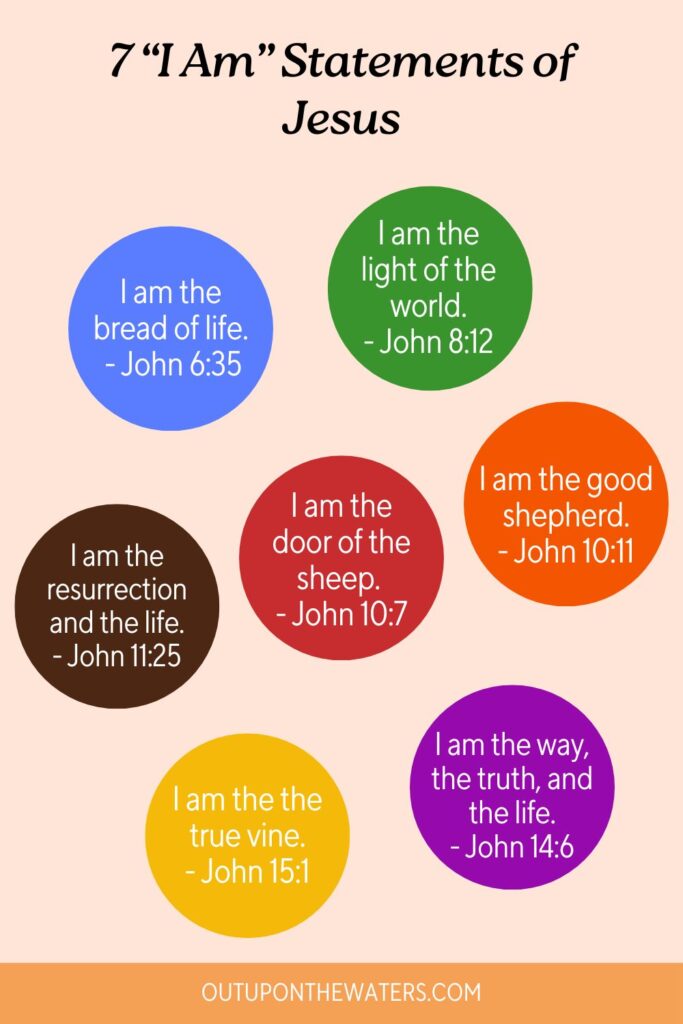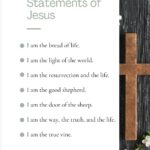In the Gospel according to John, Jesus makes seven “I am” statements that reveal his identity and purpose. These “I am” statements of Jesus emphasize his divine nature, role as a guide and provider, and his ability to grant eternal life.
“I am” as a claim to divinity
In the book of Exodus, God states His own name for the first time: “God said to Moses, ‘I AM WHO I AM.’ And He said, ‘Say this to the people of Israel: ‘I AM has sent me to you’” (Exodus 3:14).
The Hebrew term, ‘ehye ‘ăšer ‘ehye (“I am who I am”), is thought to refer to God’s eternal nature; it expresses the nature of God as the ground of all being.
Here are some of the things that we learn about the nature of God from the name “I AM WHO I AM”:
- God’s nature cannot be adequately expressed in words.
- God’s existence is different than all other existence (see Isaiah 45:6, “I am, and there is none beside me”)
- God’s existence is an existence out of time, with which time has nothing to do (John 8:58, “before Abraham was born, I am!”)
- God exists as nothing else does—necessarily, eternally, really
- God’s existence is independent and unconditional, from which all other being is derived, and on which it is dependent (God is the ground of all being)
Aside from the 7 “I am” statements of Jesus throughout the Gospel according to John, that is another “I am” statement that Jesus makes that has to do with his divinity.
In John 8:58, when the Pharisees challenge Jesus’ identity, Jesus tells them, “before Abraham was born, I am!”
Jesus’ use of the term “I am” here might be a reference to the name of God, “I am who I am”, in Exodus 3. It is also a reference to the eternal nature of Jesus himself, and thus a claim to divinity.
Charles John Ellicott notes, in Ellicott’s Commentary for English readers, that Jesus’ answer to the Pharisees’ challenge implies that “that Abraham, like all men, came into being. There was a time when he was not. But there was never a time when the Son of God was not. In the time before Abraham, in the eternity before time (John 1:1), He still was. No word which expresses becoming can be used of His existence. He is the I AM, present equally in the human “was,” and “is,” and “is to come.”
So what did Jesus mean by saying “I am”? What we learn from Jesus’ statement, “before Abraham was born, I am!” is this:
- Jesus did not come into being like Abraham came into being; He was not created, and there never was a time when He did not exist.
- Jesus’ existence, like God the Father’s existence, is an existence outside of time; Jesus equally “was”, “is”, and “is to come”.
Jesus’ statement in John 8:58 is implicitly a claim to divinity, since he is claiming to have always existed. The Pharisees understood this as a claim to equality with God, since their reaction was to stone him for blasphemy (John 8:59).
Jesus is also answering here a challenge by the Pharisees about seeing Abraham. Jesus had said to the Pharisees, “Your father Abraham rejoiced at the thought of seeing my day; he saw it and was glad.” The Pharisees scoffed at this, saying “You are not yet fifty years old…and you have seen Abraham!” (John 8:56-57) Jesus’ response is that He has seen Abraham because He has always existed. In Jewish culture, this claim to pre-existence belonged to God and God alone.

The 7 “I am” Statements of Jesus
Who did Jesus say he was? Throughout the Gospel of John, we find 7 “I am” statements of Jesus that express his nature and purpose.
- “I am the bread of life.” (John 6:35) – Jesus claims to be the spiritual sustenance that nourishes and satisfies people’s deepest needs.
- “I am the light of the world.” (John 8:12) – Jesus proclaims himself as the source of spiritual illumination, guiding people out of darkness and into the truth.
- “I am the door of the sheep.” (John 10:7) – Jesus compares himself to a door, emphasizing that he is the means through which people can have access to a relationship with God.
- “I am the good shepherd.” (John 10:11) – Jesus describes himself as the caring and protective shepherd who watches over his followers and lays down his life for them.
- “I am the resurrection and the life.” (John 11:25) – Jesus declares that he has power over death and promises eternal life to those who believe in him.
- “I am the way, the truth, and the life.” (John 14:6) – Jesus asserts that he is the exclusive path to God and ultimate reality, offering not only eternal life but also divine truth.
- “I am the true vine.” (John 15:1) – Jesus compares himself to a vine, emphasizing the importance of abiding in him for spiritual growth and fruitfulness.
These statements showcase Jesus’ self-revelation, emphasizing his divine nature, role as a guide and provider, and his ability to grant eternal life.
I am the bread of life.
Jesus said this shortly after He had fed the five thousand, and the people wanted more free food. In saying, “I am the bread of life”, Jesus is emphasizing that physical food only satisfies hunger temporarily. What Jesus offers is bigger and better than that. Jesus is claiming here to be the only one who can satisfy people spiritually. As bread sustains physical life, so Christ sustains spiritual life.
Jesus is the bread that provides life. For Jesus’ listeners, this reference to bread would also call to mind God’s sending manna to the Israeltes in the desert, when they were wandering for 40 years. The manna in the desert only satisfied the people’s physical hunger temporarily, however. And those who ate it eventually died. Those who turn to Jesus, however, are given the bread that provides eternal life.
He humbled you, causing you to hunger and then feeding you with manna, which neither you nor your ancestors had known, to teach you that man does not live on bread alone but on every word that comes from the mouth of the Lord. – Deuteronomy 8:3
I am the light of the world.
Jesus made this statement just after forgiving, rather than condemning, a woman caught in adultery whom the Pharisees had brought before Him. This was during the Feast of Tabernacles, a Jewish festival where a huge candelabra was lit in the women’s court of the temple. The candelabra was meant to remind the Israelites of the pillar of fire that guided their ancestors during the wilderness wanderings.
In claiming, “I am the light of the world,” Jesus is saying that he is the one who provides light and guidance in a lost and darkened world. Just the Israelites were led by the pillar of fire in the book of Exodus, and they were saved from the Egyptians as they crossed the Red Sea, so those who follow Jesus will be saved from the powers of sin and darkness, and given eternal life.
By day the Lord went ahead of them in a pillar of cloud to guide them on their way and by night in a pillar of fire to give them light, so that they could travel by day or night. Neither the pillar of cloud by day nor the pillar of fire by night left its place in front of the people. – Exodus 13:21-22
I am the gate of the sheepfold.
We find this “I am” statement of Jesus in His Parable of the Good Shepherd. Jesus is challenging the Pharisees’ ability to shepherd the people, and He is claiming that He is the way in which people can have access to a relationship to God. Just as a sheep must enter the sheepfold through the door, or the gate, so too we must enter God’s family, or His “sheepfold”, through Jesus.
I am the good shepherd.
This statement also comes in Jesus’ Parable of the Good Shepherd. In addition to being the “door” or the “gate”, Jesus claims that he is also the Shepherd of the sheep.
In Jesus’ time, sheep were kept in stone enclosures and the shepherd would sit or lie in the opening to prevent predators from attacking. Jesus is showing his care and his devotion for God’s people in this statement. Jesus also notes that, “The good shepherd lays down his life for the sheep” (John 10:11). As opposed to the hired hand, who runs away when there is danger, the good shepherd lays down his own life for his sheep.
The good shepherd also knows his sheep by name, and his sheep know the sound of his voice (John 10:14-16). Jesus is reinforcing his love and care for God’s people, here. He is insisting that He knows each of God’s “sheep” individually and deeply. And he is claiming that those who belong to His family, or His “sheepfold” know his voice.
For this is what the Sovereign Lord says: I myself will search for my sheep and look after them. As a shepherd looks after his scattered flock when he is with them, so will I look after my sheep. I will rescue them from all the places where they were scattered on a day of clouds and darkness. I will bring them out from the nations and gather them from the countries, and I will bring them into their own land. I will pasture them on the mountains of Israel, in the ravines and in all the settlements in the land. I will tend them in a good pasture, and the mountain heights of Israel will be their grazing land…. I will search for the lost and bring back the strays. I will bind up the injured and strengthen the weak, but the sleek and the strong I will destroy. I will shepherd the flock with justice. – Ezekiel 34:11-16
I am the resurrection and the life.
Jesus makes this statement when comforting Martha, the sister of Lazarus, after his death. Martha had sent word to Jesus that Lazarus was sick, hoping for healing. By the time Jesus arrives, Lazarus has died. Jesus tells Martha, “Your brother will rise again” (John 11:23). Martha thinks this means on the last day. Jesus, however, means that he will rise much sooner than that. After this conversation, Jesus raises Lazarus from the dead.
This “I am” statement of Jesus means that Jesus is the source of life and the source of resurrection. He has the power to raise the dead. And he has the power of eternal life. Jesus notes that whoever believes in Him shall have eternal life (John 11:26).
I am the way, the truth, and the life.
Before His death, Jesus tells His disciples that He is going to His Father’s house to prepare a place for them. Thomas responds, “Lord, we don’t know where you are going, so how can we know the way?” And Jesus answers, “I am the way and the truth and the life. No one comes to the Father except through me. If you really know me, you will know my Father as well. From now on, you do know him and have seen him” (John 14:5-7).
In this statement, Jesus is claiming to be the path to God. He is the one who reveals God the Father, and we can know the Father because we know His Son. Like Jesus’ statement that he is the “gate” or the “door” of the sheep pen, this statement says that Jesus is the way through which we can come to God.
It is also likely that Jesus is contrasting himself to the many ways in the Old Testament that the people could come to God. There is now no longer any need for sacrifices, as the system of sacrifices, temple, the curtain, tabernacle, and other means of worship were temporary “ways” to God. God has revealed Himself now through Christ Jesus. Significantly, this is also related to the temple curtain being torn upon Jesus’ death: We know have direct access to God because of Jesus’ life, death, and resurrection.
Jesus is the only one who provides the way to the Father. He is the full revelation of the Father (the truth). And he is the means to eternal life. Jesus is telling us that there’s nowhere else to look; nowhere you need to look or can look to find the true path to God.
I am the true vine.
In discussing His relationship to God the Father, and His followers relationship to Himself, Jesus says, “I am the vine; you are the branches. If you remain in me and I in you, you will bear much fruit; apart from me you can do nothing” (John 15:5).
Jesus describes God the Father as the gardener, and Himself as the true vine. It is God who provides for us, who prunes us, protects us, and nourishes us. And it is through Jesus Christ that we have access to eternal life, and through Him we can bear fruit. By abiding in, dwelling in, or attaching ourselves to Christ, we enable His life to flow through us. Without Him, we would wither and die. If we want to reach our full potential and bear much fruit, then we should stick close to Jesus.
(This statement is similar to Jesus’ statement, “I am the bread of life”; in both cases, Jesus is claiming to be the source of our life, and the one who sustains us.)
“Sing about a fruitful vineyard:
I, the Lord, watch over it;
I water it continually.
I guard it day and night
so that no one may harm it.
I am not angry.
If only there were briers and thorns confronting me!
I would march against them in battle;
I would set them all on fire.
Or else let them come to me for refuge;
let them make peace with me,
yes, let them make peace with me.
In days to come Jacob will take root,
Israel will bud and blossom
and fill all the world with fruit.“
Isaiah 27:2-6
But the fruit of the Spirit is love, joy, peace, forbearance, kindness, goodness, faithfulness, gentleness and self-control. Against such things there is no law. – Galatians 5:22-23

